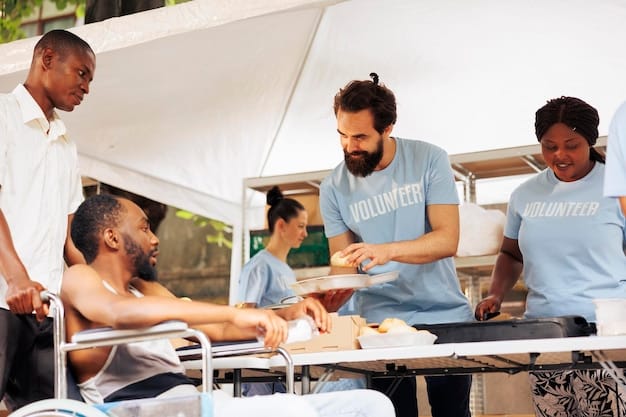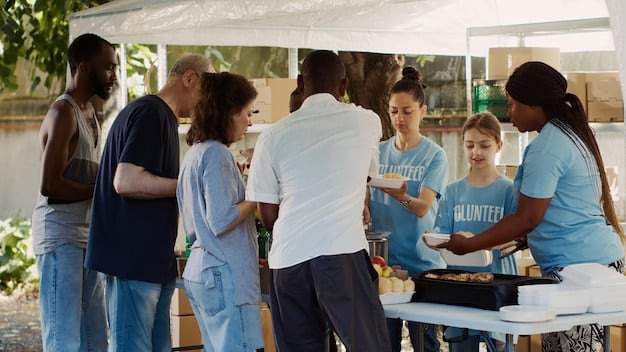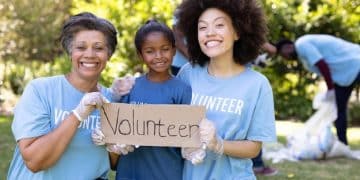US Volunteers and UN Relief: Your 2025 Guide to Contributing

US volunteers can significantly contribute to UN-supported relief programs in 2025 through various avenues, including direct field work, remote assistance, fundraising, advocacy, and skills-based volunteering, all tailored to specific UN initiatives and needs.
Want to make a global impact? This guide explores how US volunteers can contribute to UN-supported relief programs in 2025, providing practical pathways to get involved and make a difference.
Understanding UN Relief Programs
Before diving into volunteer opportunities, it’s crucial to understand the scope and nature of UN relief programs. These initiatives address a wide range of humanitarian crises.
They also span from natural disasters to conflict zones, and public health emergencies.
Types of UN Relief Programs
The UN operates various specialized agencies and programs that focus on different aspects of relief and development. Knowing these can help you align your skills and interests.
- UNHCR (United Nations High Commissioner for Refugees): Focuses on protecting refugees, forcibly displaced communities and stateless people.
- WFP (World Food Programme): Tackles global hunger and promotes food security.
- WHO (World Health Organization): Leads international health efforts, including emergency response.
- UNICEF (United Nations Children’s Fund): Provides humanitarian and developmental assistance to children worldwide.
These are just a few of the key UN bodies, and each offers diverse opportunities for volunteers.

Direct Field Work Opportunities for US Volunteers
One of the most impactful ways to contribute is through direct involvement in field operations. This involves being on the ground, assisting with the immediate needs of affected populations.
This can range from distributing supplies to providing medical assistance.
Roles and Responsibilities in the Field
Field volunteers play a vital role in the day-to-day operations of relief programs. Their responsibilities are diverse and depend on the specific program and location, but they might include:
- Assisting with the distribution of food, water, and hygiene kits.
- Providing basic medical care and support under the supervision of medical professionals.
- Helping to set up and manage temporary shelters and camps.
- Offering psychosocial support to affected individuals and communities.
Volunteers often work long hours in challenging conditions, but the rewards of making a tangible difference are immense.
Remote Assistance and Online Volunteering
If you’re unable to travel or prefer to contribute from home, remote assistance and online volunteering offer valuable alternatives. Many UN programs require online support.
This includes tasks like translation, data analysis, and project management.
Skills-Based Online Volunteering
Leveraging your professional skills online can provide critical support to UN relief efforts. Here are some areas where volunteers can make a significant impact:
- Translation and Interpretation: Translating documents or interpreting during virtual meetings ensures effective communication.
- Data Analysis: Analyzing data to identify trends and inform decision-making processes.
- Graphic Design and Web Development: Creating informational materials or improving online accessibility.
- Project Management: Assisting with the planning, coordination, and monitoring of projects.
Online volunteers can contribute their expertise while working remotely, providing much-needed support to UN teams.
Fundraising and Resource Mobilization
Financial resources are essential for the success of any relief program. US volunteers can play a crucial role in mobilizing funds and raising awareness.
This can be done through various creative fundraising initiatives.

Organizing Fundraising Events
Creative fundraising events can engage communities and generate substantial support for UN relief efforts. Consider these examples:
- Charity Runs and Walks: Organize a local run or walk to raise money and awareness.
- Auctions and Raffles: Solicit donations from local businesses for auctions or raffles.
- Crowdfunding Campaigns: Launch an online crowdfunding campaign to reach a wider audience.
- Awareness Events: Host events to educate people about specific issues and encourage donations.
Effective fundraising efforts can significantly boost the resources available to UN relief programs.
Advocacy and Awareness Campaigns
Raising awareness about humanitarian issues and advocating for policy changes are vital contributions. Volunteers can influence public opinion and support.
They can also contribute to create a more compassionate and responsive world.
Using Social Media for Advocacy
Social media platforms offer powerful tools for raising awareness and engaging with a global audience. Here’s how volunteers can use social media effectively:
- Share Information: Post updates, articles, and stories about UN relief programs.
- Engage with Influencers: Partner with influencers to amplify messages.
- Create Visual Content: Develop infographics and videos to explain complex issues in an accessible way.
- Start Conversations: Encourage discussions and debates about humanitarian issues.
By using social media strategically, volunteers can reach a broad audience and drive meaningful change.
Skills-Based Volunteering: Leveraging Your Expertise
Beyond general volunteering, many UN programs actively seek skilled professionals. This allows volunteers to contribute their expertise in specialized areas.
This includes fields like engineering, healthcare, and education.
Examples of Skills-Based Contributions
If you possess specific skills or experience, there are numerous ways to apply them to UN relief programs. Here are a few examples:
- Medical Professionals: Provide medical care, train local healthcare workers, and assist with public health initiatives.
- Engineers: Design and construct infrastructure, develop water and sanitation systems, and implement renewable energy solutions.
- Educators: Develop educational materials, train teachers, and provide educational support to children.
- IT Specialists: Develop and maintain IT systems, provide technical support, and enhance online communications.
Skills-based volunteering maximizes the impact of your contribution, providing valuable expertise to those in need.
Preparing for a Volunteer Assignment
Before embarking on a volunteer assignment with a UN relief program, thorough preparation is essential. This ensures you are ready for the challenges.
It also helps to maximize your effectiveness.
Essential Steps for Preparation
Proper preparation can make a significant difference in the success of your volunteer experience:
- Research the Program: Understand the goals, objectives, and activities of the specific program.
- Acquire Necessary Skills: Identify any required skills and obtain relevant training.
- Understand Cultural Sensitivity: Learn about the local culture and customs to avoid misunderstandings.
- Pack Appropriately: Pack essential items, including clothing, medical supplies, and personal hygiene products.
By taking these steps, you can ensure that you are well-prepared to contribute effectively to UN relief efforts.
| Key Point | Brief Description |
|---|---|
| 🌍 Direct Field Work | Assist with immediate needs like food distribution and medical aid in affected areas. |
| 💻 Remote Assistance | Offer translation, data analysis, and project management support online. |
| 💰 Fundraising | Organize charity events and crowdfunding campaigns to mobilize resources. |
| 📣 Advocacy | Raise awareness on social media and advocate for policy changes. |
Frequently Asked Questions
Skills needed vary, but common demands include medical expertise, engineering, IT, education, translation, and project management skills, enhancing relief efforts.
Explore the UN Volunteers website and specialized agency sites (like UNHCR, WFP, WHO) for listings, tailoring your search to your skills and interests.
Yes, remote volunteering offers many opportunities in translation, data analysis, and online advocacy, allowing you to contribute from home.
Most UN volunteer programs require volunteers to be at least 18 years old, but specific age requirements may vary depending on the program.
Financial support varies; some positions offer stipends, while others require self-funding. Check each program’s details for specific financial arrangements.
Conclusion
US volunteers have a multitude of avenues to contribute to UN-supported relief programs in 2025, whether through direct field work, remote assistance, fundraising, advocacy, or skills-based volunteering. By understanding the needs of these programs and preparing accordingly, you can play a vital role in making a positive impact on the lives of those affected by humanitarian crises worldwide.





